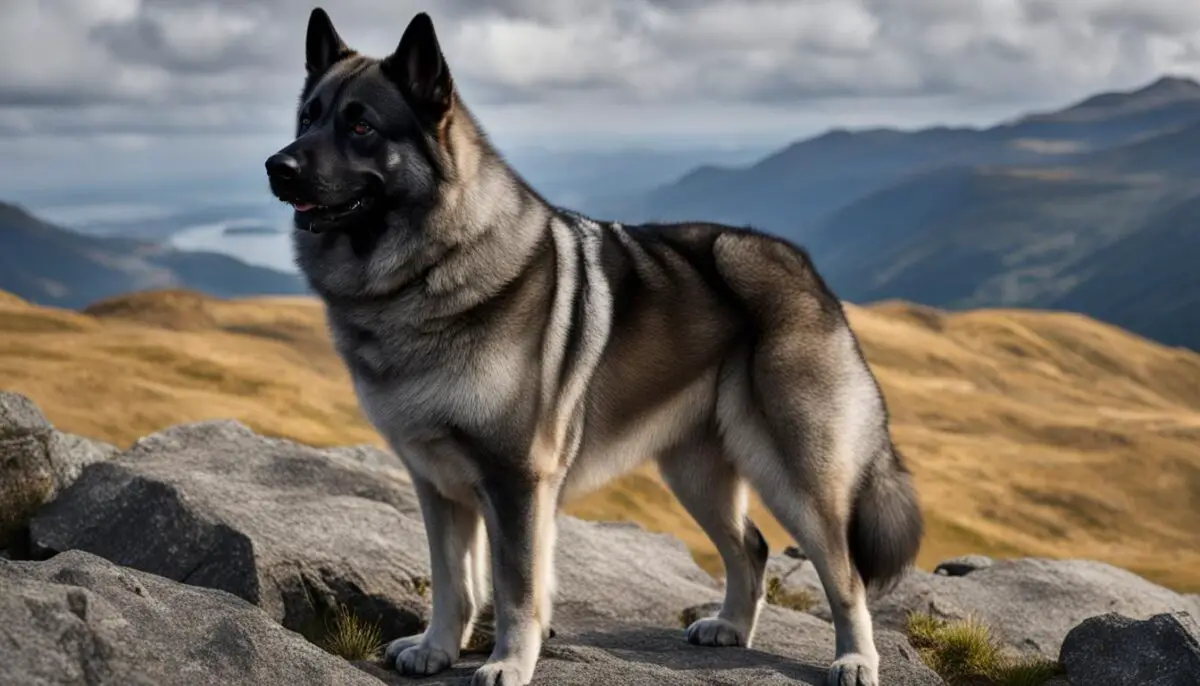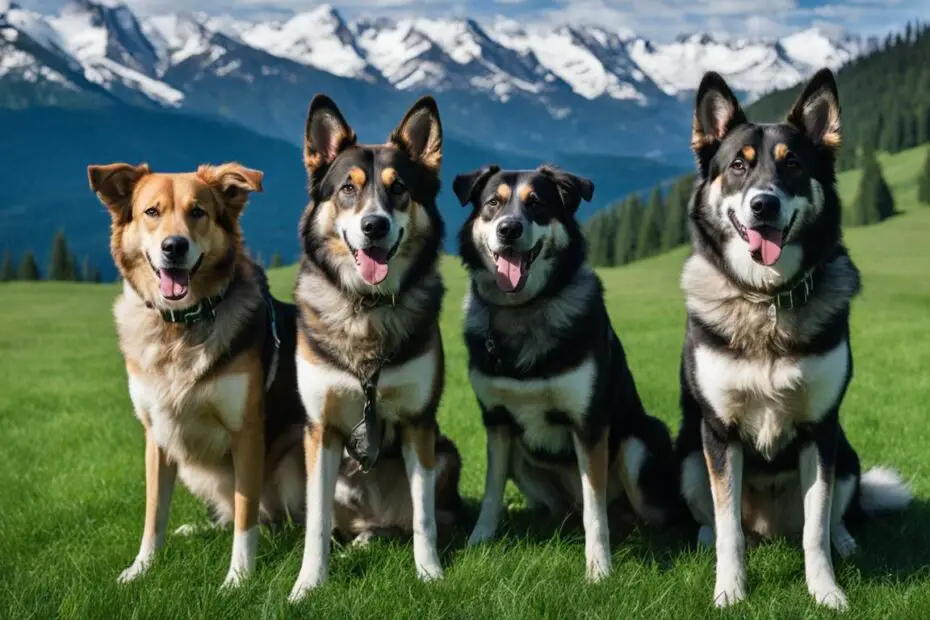Are you considering adding a canine companion to your family? Look no further than Elkhorn dogs! These remarkable breeds, including the Norwegian Elkhound, are known for their unique qualities and make excellent companions. From their striking appearance to their loyal and affectionate nature, Elkhorn dogs have it all. In this article, we will explore the key information and care tips to help you make an informed decision about owning an Elkhorn dog.
Key Takeaways:
- Elkhorn dogs, such as the Norwegian Elkhound, are loyal and devoted companions.
- Prioritize adoption from rescue organizations or reputable breeders to ensure the well-being of Elkhorn dogs.
- Elkhorn dogs have a medium size, with a thick, double coat that requires regular grooming.
- They are intelligent, independent, and have high energy levels, requiring plenty of exercise and mental stimulation.
- Common health problems in Elkhorn dogs include hip dysplasia, elbow dysplasia, and eye issues.
Norwegian Elkhound Breed Characteristics
The Norwegian Elkhound is a medium-sized dog breed with a hardy, square build and upright ears. Known for their intelligence and independence, they are fiercely loyal and affectionate towards their families. Their coat is medium in length and requires moderate grooming to maintain its health and shine. With a distinct wolf-like appearance, the Norwegian Elkhound captivates hearts with its striking beauty.
These dogs are highly energetic and require daily exercise to thrive. A minimum of 40 minutes of physical activity is recommended to keep them mentally and physically stimulated. Regular exercise not only helps with their overall well-being but also prevents behavioral issues that can arise from pent-up energy.
Training is essential for Norwegian Elkhounds due to their independent nature. They benefit from early socialization and consistent positive reinforcement training methods. With the right approach, they can become well-mannered and obedient companions.
It’s important to be aware of some common health issues that Norwegian Elkhounds may face. These include hip dysplasia, elbow dysplasia, and eye problems. Regular vet check-ups and a balanced diet are crucial for maintaining their overall health and longevity.
Historically, Norwegian Elkhounds have deep roots dating back to 5000 B.C.E. and were primarily bred for hunting big game. They possess a range of skills such as tracking, herding, and guarding, making them versatile working dogs. Today, while their hunting instincts may still be present, they excel as loyal family pets.
Key Characteristics:
- Size: Medium
- Coat: Medium-length double coat
- Temperament: Intelligent, independent, loyal, and affectionate
- Exercise Needs: Minimum of 40 minutes of exercise per day
- Training: Requires early and consistent training due to their independent nature
- Health: Common health issues include hip dysplasia, elbow dysplasia, and eye problems

Considerations for Owning a Norwegian Elkhound
When considering owning a Norwegian Elkhound, it’s important to carefully consider your options and make informed choices. This section will guide you through key considerations related to Norwegian Elkhound adoption, breeder selection, care, supplies, services, and events.
Adoption and Breeder Selection
If you’re looking to provide a loving home to a Norwegian Elkhound, adoption from rescue organizations or reputable breeders is highly recommended. Adoption not only saves a life but also offers a second chance to a dog in need. Reputable breeders prioritize the health and temperament of their dogs, ensuring a well-adjusted and well-cared-for companion.
To ensure you’re working with a reputable breeder, conduct thorough research. Look for breeders who follow ethical practices and provide a nurturing environment for their puppies. Ask for references and visit the breeding facility to see the conditions firsthand. Responsible breeders will be happy to provide all necessary information and answer any questions you may have.
Caring for Your Norwegian Elkhound
Owning a Norwegian Elkhound requires providing proper care, which includes grooming, exercise, and regular veterinary check-ups. The thick, double coat of the Norwegian Elkhound requires regular brushing to maintain its condition and prevent matting. Daily exercise is necessary to meet their high energy levels and prevent boredom-related behaviors.
Regular visits to the veterinarian are crucial for ensuring your Norwegian Elkhound’s long-term health. Vaccinations, deworming, flea, and tick prevention, and dental care are all essential aspects of responsible pet ownership.
Supplies for Your Norwegian Elkhound
Equipping yourself with the right supplies is essential to provide a comfortable and enjoyable environment for your Norwegian Elkhound. Some basic supplies you’ll need include:
- A suitable collar and leash for walks
- Quality dog food to meet their nutritional needs
- Comfortable bedding for resting
- Interactive toys to stimulate their minds
Additionally, consider investing in a secure and comfortable crate for crate training and safe transportation.
Utilizing Services and Events
To enhance your Norwegian Elkhound’s well-being and socialization, consider utilizing various services and attending dog events. Training classes can help you establish a strong bond with your dog and ensure they develop good behavior. Doggy daycare or pet sitting services can provide companionship and exercise when you’re unable to be present.
Attending dog events, such as obedience trials, agility competitions, or breed-specific gatherings, can provide opportunities for socializing with other dogs and their owners. Check out local community events or dog clubs that cater to Norwegian Elkhounds and their owners to discover new experiences and gain valuable knowledge.
By focusing on these considerations, you’ll be well-prepared to provide a loving and fulfilling life for your Norwegian Elkhound.
Finding the Perfect Dog for Your Lifestyle
When it comes to choosing a dog breed, the selection process should go beyond their adorable looks. It’s crucial to consider your own lifestyle and personality to find the perfect furry companion. By evaluating various factors, such as your household composition, work schedule, activity level, experience with dogs, and any allergies, you can ensure a harmonious match.
Every dog breed possesses unique characteristics that determine their adaptability to different living situations, energy levels, and compatibility with children or other pets. For instance, Labrador Retrievers are renowned for their friendly and affectionate personalities, making them an excellent choice for families with kids. If you’re an active individual looking for a sporting partner, Border Collies’ energy and athleticism make them a suitable companion. On the other hand, Bulldog breeds are known for their gentle and calm nature, making them ideal for those seeking a more laidback dog.
For individuals with allergies, certain dog breeds with low-shedding coats may be more suitable. These breeds minimize the amount of hair and dander released into the environment, reducing the risk of triggering allergies. Researching breed characteristics and considering your own lifestyle and preferences will help you make an informed decision when selecting a dog.
Remember, a well-suited dog breed not only brings joy to your home but also enhances your own quality of life. Don’t rush the process; take the time to evaluate your needs and find a breed that complements your lifestyle.
Factors to Consider:
- The composition of your household
- Your work schedule
- Your activity level
- Your experience with dogs
- Any allergies you may have
Examples of Dog Breeds and Lifestyle Matches:
| Dog Breed | Personality | Activity Level | Compatibility |
|---|---|---|---|
| Labrador Retriever | Friendly and affectionate | High | Excellent with children |
| Border Collie | Energetic and athletic | Very high | Suitable for active owners |
| Bulldog breeds | Gentle and calm | Low to moderate | Well-suited for a relaxed lifestyle |
Keep in mind that while these examples highlight some popular breed matches, there are numerous other breeds available, each with their own unique qualities. Taking the time to understand breed characteristics and align them with your lifestyle will help you find the perfect dog that will bring years of joy and companionship.
Conclusion
Owning an Elkhorn dog, such as the Norwegian Elkhound, requires careful consideration and responsible ownership. These dogs have unique characteristics and care needs that should be taken into account. Prioritizing adoption from rescue organizations or reputable breeders can ensure the well-being of the dogs and contribute to a harmonious living environment.
Understanding the breed’s size, coat, temperament, exercise needs, training requirements, and potential health issues is crucial for providing proper care. Norwegian Elkhounds are medium-sized dogs with a thick, double coat. They are known for their intelligence, independence, loyalty, and affection toward their families. Regular exercise is essential to meet their high energy levels, and early and consistent training is necessary due to their independent nature. Common health issues in the breed include hip dysplasia, elbow dysplasia, and eye problems.
Additionally, finding a dog that matches your lifestyle, preferences, and personality will lead to a fulfilling and loving companionship. When selecting a dog breed, consider factors such as your household composition, work schedule, activity level, experience with dogs, and allergies. Researching breed characteristics and consulting with reputable breeders or rescue organizations can help you make an informed decision.
Remember, owning a dog is a long-term commitment and should be approached with dedication and care. By providing the proper care, training, and love, you can ensure a happy and healthy life for your Elkhorn dog.
FAQ
What are the characteristics of the Norwegian Elkhound breed?
The Norwegian Elkhound is a medium-sized dog breed with upright ears and a hardy, square build. They have a medium-length double coat that requires moderate grooming. The breed is known for its intelligence, independence, loyalty, and affection toward its family. Norwegian Elkhounds are high-energy dogs and require at least 40 minutes of exercise per day to thrive. They also need early and consistent training due to their independent nature. Common health problems seen in the breed include hip dysplasia, elbow dysplasia, and eye issues. It’s important to note that the Norwegian Elkhound is an ancient breed with a rich history dating back to 5000 B.C.E. They were originally used for hunting big game and have various skills, including tracking, herding, and guarding.
What should I consider before owning a Norwegian Elkhound?
When considering owning a Norwegian Elkhound, it’s recommended to prioritize adoption from rescue organizations or reputable breeders. Adoption provides a loving home to a dog in need, while reputable breeders prioritize the health and temperament of their dogs. It’s important to conduct thorough research to ensure that the breeder follows ethical practices and provides a nurturing environment for the puppies. As an owner, you should be prepared to provide proper care for your Norwegian Elkhound, which includes grooming, exercise, and regular veterinary check-ups. Additionally, you’ll need to have the necessary supplies for your dog, such as a suitable collar and leash, dog food, toys, and bedding. Consider utilizing services like training classes or dog events to enhance your dog’s well-being and socialization.
How do I choose the right dog breed for my lifestyle?
When choosing a dog breed, it’s essential to consider your lifestyle and personality to find the perfect match. Factors to think about include the composition of your household, your work schedule, your activity level, your experience with dogs, and any allergies you may have. Different breeds have varying adaptability to different living situations, energy levels, and affinity for children or other pets. For example, Labrador Retrievers are known for being good with kids and have friendly, affectionate personalities. Border Collies are energetic and athletic, making them suitable for active owners. Bulldog breeds are gentle and calm, making them a good choice for those looking for a more laidback dog. Furthermore, some breeds may be better suited for people with allergies due to their low-shedding coats. Researching breed characteristics and considering your own lifestyle and preferences will help you make an informed decision when selecting a dog.

